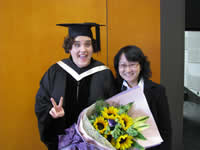Saur, Eva-Maria Heidrun
BA Student

Hence I successfully applied for going to CUHK for one year, taking two Linguistics courses in the 1st term in 2006/2007. This not only gave me an overview of what language does, but also how CU Linguistics students work. Designing experiments and collecting data, discussing findings in the group and defending the results during the final presentation in front of the class was a very gratifying learning experience. Even though I had to learn later that the academic challenges at CUHK can be a burden, I was also pushed towards discipline and learnt to strive for excellence, which has become a crucial experience for me.
After having a taste of linguistics in the 1st term in 2006/07, I took 4 Linguistics courses in the 2nd term, whereby my new course selection reflected more how language works in the human mind than what language does. I have to say a special “thank you” to Prof Virginia Yip for her teaching of Second Language Acquisition. My final project in this course focused on the acquisition of the binding parameters of English reflexives by German high school students and without knowing, I had stepped into the Linguistic field that I find absolutely thrilling -Morphosyntax! In fact, three years from taking the course Second Language Acquisition, I would sit in a graduate course at the University of Massachusetts Amherst (a very prestigious Linguistics school) as an exchange student of CUHK and again discuss the differences between the binding behavior of German and English.
As can be deduced from this statement, I did not return to Heidelberg University to finish my studies, but successfully applied to CUHK, thus becoming a full-time undergraduate student in Linguistics and a member of Chung Chi College. At Chung Chi, I made new friends at Chung Chi Toastmasters Club, where I honed my public speaking skills and met interesting people at the various Toastmasters competitions in Hong Kong. Now I can take the chance to thank all the administrative hands at Chung Chi and I-House, for providing me with the nurturing atmosphere I needed in order to feel at home in Hong Kong.
In 2007/2008 my syntax journey went on with Prof Thomas Lee’s inspiring course First Language Acquisition. Summarizing what I learnt in this class would take up too much space, but I would like to point out the importance of this course for my decision in pursuing graduate studies in Psycholinguistics.
As you can imagine, I took many other courses besides the two acquisition courses. Each of them gave me a new perspective on Linguistics, thereby providing me with a detailed overview on the subject matter and enabling me to choose a specialization area for my graduate studies. I am convinced that we have the best undergraduate curriculum for understanding what language does in the human mind.
At this point I would like to express my deep gratitude to all of my Linguistics teachers -both at CUHK and UMass Amherst for their motivation, patience, mentoring and their incredible teaching! A special thanks to Prof Gladys Tang - for everything. And last but not least, a heartfelt thank you to our General Office Team for their organizational genius in maneuvering me through all the requirements of the new international student status at CUHK.
Being an international student at CUHK is never easy. Many students and also staff members did not even know that people like me existed. It can be difficult if you are regarded as a “老外/ 鬼佬” by Mainland Chinese and Hong Kong students, whereas your fellow Germans might view you as "too adapted to Chinese culture". In my eyes it is important to reach out to all groups on campus, to attempt to learn as much as possible about them and to make friends with them. But in the end, being a Linguistics student at CUHK is worth all the trouble.
